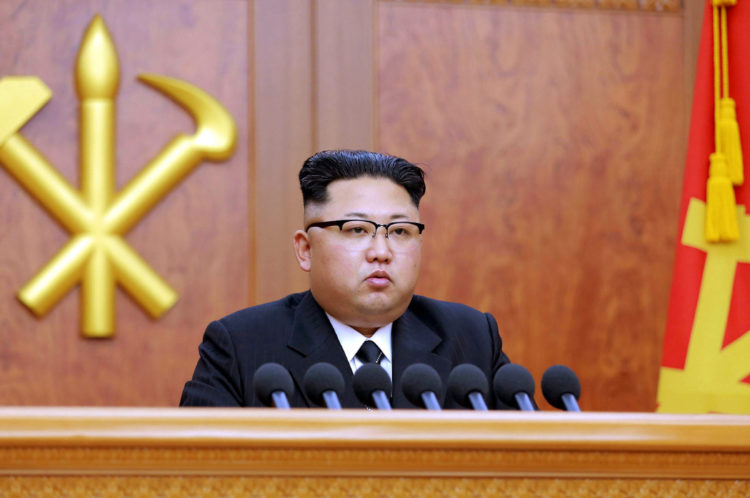White House Rules Out North Korea Talks After Tillerson Remarks

published Oct 2, 2017, 7:40:52 PM, by Jennifer Epstein, Nick Wadhams and Keith Zhai
(Bloomberg) —
The White House ruled out talks with North Korea over its nuclear arsenal just days after Secretary of State Rex Tillerson said the U.S. was talking to North Korea “directly, through our own channels.”
White House spokeswoman Sarah Sanders told reporters Monday that “now is not the time to talk.” She added that the U.S. was interested solely in talks over freeing three U.S. citizens held by the reclusive regime.
The statements were the latest sign that President Donald Trump and his top diplomat have different views on the best way to address North Korea’s accelerating nuclear and ballistic missile programs. While Tillerson was heading back to the U.S. from China on Sunday, Trump said on Twitter that he’d told his “wonderful” secretary of state that “he is wasting his time trying to negotiate with Little Rocket Man,” a reference to North Korean leader Kim Jong Un.
“Save your energy Rex, we’ll do what has to be done!” Trump added.
During his campaign for president, Trump said he could sit down to negotiate with Kim over a hamburger. But he seems to have abandoned that line. The president this weekend referred to diplomatic efforts by former Presidents Bill Clinton, George W. Bush and Barack Obama, saying in a Twitter posting that “being nice to Rocket Man hasn’t worked in 25 years, why would it work now? Clinton failed, Bush failed, and Obama failed. I won’t fail.”
Kim took over the leadership of North Korea in 2011 after the death of his father, Kim Jong Il.
Kim responded to Trump’s “rocket man” taunts in North Korea’s state media by calling the U.S. leader a “dotard” and promising the “highest level of hard-line countermeasure in history.” His foreign minister said the regime’s options included testing a hydrogen bomb over the Pacific Ocean.
“Every North Korean — regardless of how he or she actually feels — must publicly push back against such slurs,” Andray Abrahamian, a visiting fellow at the Jeju Peace Institute in South Korea, wrote in an essay on the 38 North website. “As long as insults continue, it is difficult to imagine anyone in Pyongyang considering meaningful talks to diffuse this crisis. In a fast-moving situation, any time lost could be catastrophic.”
Trump’s Visit
Tillerson spent just one full day on the ground in China, partly to lay the groundwork for a visit by Trump next month. While China’s leaders have backed the last two rounds of UN sanctions, they’ve pushed back against the view in Washington that they have more leverage with Kim and have sought to get the Trump administration to do more.
“China would like to see the U.S. take the lead on solving the issue,” said Da Zhigang, director of the Institute of Northeast Asian Studies at the Academy of Social Sciences in Heilongjiang province. “Direct dialogue between Trump and Kim would be a relief to China, which has been trying to offload the burden and pressure of North Korea’s nuclear development.”
The Chinese foreign ministry has consulted with policy experts in recent weeks to seek their views on potential diplomatic solutions to the North Korean crisis, according to a person who attended the meetings but isn’t authorized to speak publicly. Beijing is North Korea’s biggest trading partner and its main backer.
Sanders said the lack of talks doesn’t mean an end to diplomacy. The U.S. has led two recent rounds of economic sanctions at the United Nations, and Sanders suggested similar efforts will continue.
“There’s a difference between talking and putting diplomatic pressure,” Sanders said. “We still support putting diplomatic pressure” on North Korea, she added.
Trump has threatened to destroy North Korea if provoked and repeatedly said military options are on the table. Tillerson is a chief architect of an initiative that seeks to use UN Security Council sanctions to choke North Korea’s economy while pressing countries to stop accepting North Korean guest workers and close the regime’s diplomatic outposts.
It’s not the first time Trump and Tillerson have diverged — or appeared to diverge — publicly. Tillerson found himself contradicted by the president about an hour after the secretary of state called in June for a Saudi-led coalition to ease its “blockade” of Qatar. Soon after that event, Trump said he backed the Saudi effort because Qatar was historically “a funder of terrorism at a very high level.” That crisis continues to fester.
Nor does the disagreement necessarily signal Tillerson’s job is at risk. Asked directly whether Tillerson retains the president’s confidence, spokeswoman Sanders said he does.
To contact the reporters on this story: Jennifer Epstein in Washington at jepstein32@bloomberg.net ;Nick Wadhams in Washington at nwadhams@bloomberg.net ;Keith Zhai in Singapore at qzhai4@bloomberg.net To contact the editors responsible for this story: Alex Wayne at awayne3@bloomberg.net Andy Sharp, Brendan Scott
COPYRIGHT © 2017 Bloomberg L.P



No Comment